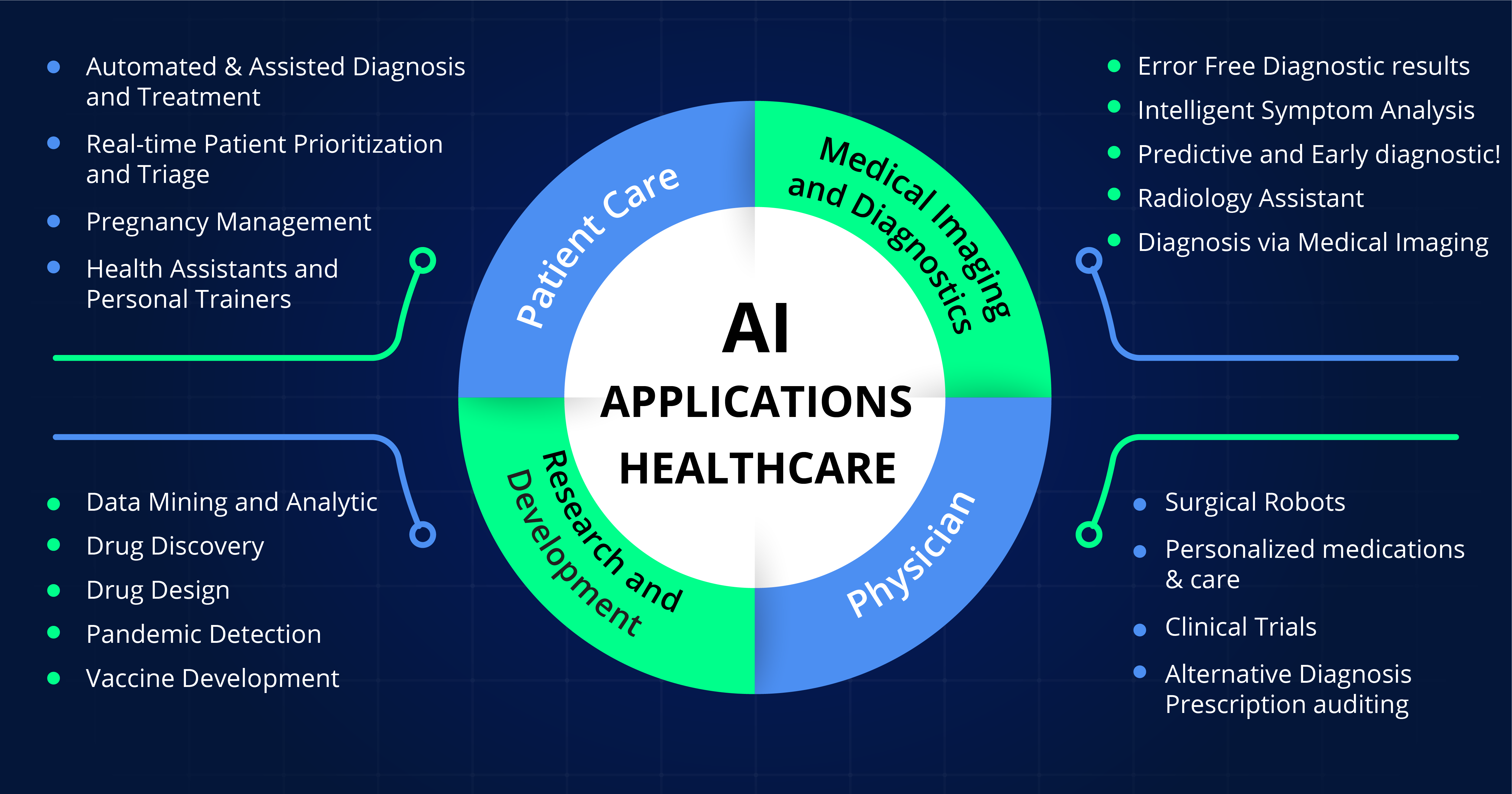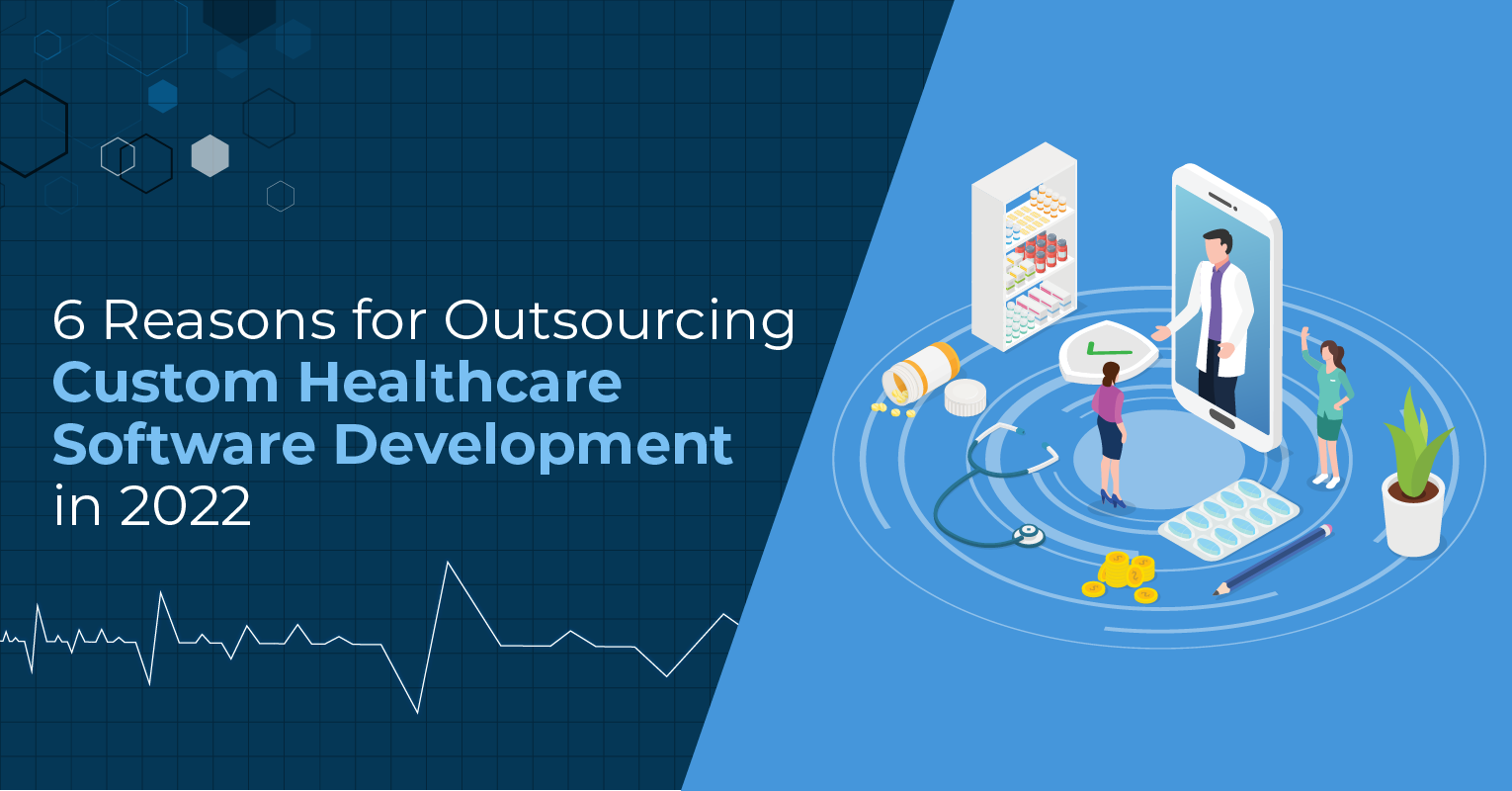We live in a world of technology dichotomy; while many are grappling with Digital transformation and legacy systems, others have forged ahead with AI and ML to see remarkable progress.
A lot has changed in one year; AI has slowly turned from a costly and complex option to a necessity. Here is why:
- It is the only option for Accessible, Affordable, and Quality healthcare
- It can catalyze the shift from – physician-centric to more patient-centric care
- Shortage of care workers is a concerning issue
- Medical Error reduction and efficiency
According to McKinsey, AI and automation technologies can add value to nursing activities by 10% by 2030, while Accenture estimates that AI will engage with 20% of unmet demand by 2026. The estimates may vary, but AI is rising to be an integral part of the healthcare system.
Four Pillars of AI Applications in Healthcare
AI is adding value in many areas, but four areas remain the mainstay.

Patient Care
- Health Assistants and Personal Trainers
AI-based chatbots are being used as health assistants and personal trainers. Some of the use cases of chatbots in healthcare include scheduling doctor appointments, providing medication reminders, and identifying the condition based on symptoms. Start-ups like Babylon Health and
- Automated and Assisted Diagnosis & Treatment
AI-enabled chatbots are getting good at helping patients with self-diagnosis as well as in assisting doctors for the same based on symptoms and condition of the patient. Today, they function in an assistive capacity, but in the future, as acceptance grows, they will do more.
- Pregnancy Management
Monitor the progress and stay worry-free with early diagnosis.
- Real-time Patient Prioritization and Triage
Prescriptive analytics on patient data to enable accurate real-time case prioritization and triage.
Empowered Physician
- Personalized Medications and Care
AI uses patient data to identify the best treatment plans thereby lowering cost, improving cure effectiveness, and reducing time to recovery.
- Surgical Robots
Today, robotics has improved enough to assist surgeons, with rapid leaps in AI, their role would become increasingly integral to surgeries as they excel in repetitive and tedious tasks while helping surgeons increase the precision of surgery.
- Prescription Auditing
AI audit systems are getting good at lowering prescription errors.
- Clinical Trials
AI algorithms easily medical data and help in the identification of patients’ responses to treatments based on their characteristics, thereby, helping deliver personalized medicine and treatment at scale.
- Alternate Diagnosis
Not only digital, but microorganisms also evolve fast, and so is the research in the field. It is not possible to know every development and with the assistance of AI, physicians can get the benefit of an alternate diagnosis that can prevent error.
Medical Imaging and Diagnostic
- Error Free Diagnostic results
Be loose over millions of people every year due to misdiagnosis, and AI can help change that. Its accuracy in producing diagnosis results eliminates human error, thus saving lives and costs.
Intelligent Symptom Analysis
- Predictive and Early Diagnostics
Be it cancer, or tumor, or any other disease AI has incredible predictive power that analyzes the data t, o predict a condition at the earliest.
- Radiology Assistant
AI-enabled assistants produce the report of the scan with high accuracy.
- Diagnosis via Medical Imaging
Skin cancer, oxygen level, and many other conditions are now diagnosed by AI-powered medical imaging. The speed of results and their accuracy both are game-changing advancements.
Research and Development
- Data Mining
AI is currently being deployed in the data mining of medical records. Cognitive technologies are helping healthcare organizations leverage vast data trove to power diagnosis.
- Drug Discovery
AI-startups such as Helix respond to verbal questions and requests and help in augmenting efficiency, better lab safety, manage inventory while staying updated on recent research.
- Drug Design
AI is now powering and automating drug design and compound selection by predicting protein characteristics which enable researchers to simplify protein design, streamline production issues, and discover new protein features.
- Pandemic Detection
Applications such as BlueDot provide early warning systems for identifying pandemics by scanning hundreds and thousands of media sources worldwide in all the languages daily to foretell outbreaks in real-time.
- Genetic Engineering
AI helps companies produce better genetic material and identify the disease and its treatment.
Taking the Digital Leap with AI
AI is a rapidly evolving need for medical institutions. Yes, regulations, cybersecurity, and Privacy issues loom large, but it is the matter of addressing them and not of questioning the suitability of AI.
The playing field in AI is getting even by day and calls for companies of all shapes and sizes to accept AI and take its help in serving the patients better.
 All Posts
All Posts


